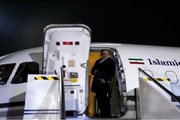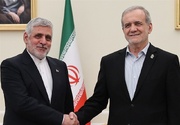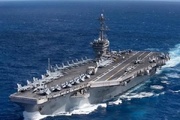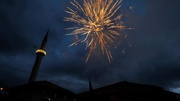As a result, economic relations between Iran and the Russian Federation have been offered with many new opportunities in post-JCPOA era and the deal will be an end to an eight-year period in which trade exchanges between the two countries were in decline.
Shortly after the landmark nuclear deal between Iran and six global powers, Russian President Veladimir Putin traveled to Tehran and pledged to deepen their economic and political ties in the post-nuclear deal era.
More signs also indicate that Russia is already working on what may be a special economic alliance with Iran and is preparing a road map for dozens of joint economic projects with Iran.
In an indication of Russia's goodwill to promote cooperation with its neighboring country, Iran, the Russian Federation Council chief Valentina Ivanovna, heading a high-ranking delegation, arrived in Iran on Nov 13 for a two-day official visit.
The visit of the head of the Russian Federation Council to Iran was part of visits between Tehran and Moscow following the implementation of JCPOA and would mark a significant landmark for fostering the level of trade transactions, as well as parliamentary, economic and security cooperation between the two nations.
In an interview with Rossiya Segodnya News Agency prior to her visit to Iran, Ivanovna underscored that relations between Tehran and Moscow will regularly continue at the highest level possible as a token of close cooperation between the two countries, adding the parliaments of the two countries enjoy constructive and active cooperation as well.
Touching upon successful outcomes of fostering ties between the Iranian and Russian parliaments, she stressed that the visit is another step forward to consolidate bilateral relations which is of high significance for the whole region.
While in Iran, she discussed variety of issues including ways to improve parliamentary cooperation and reinforce convergence in the Middle East to fight terrorism in Syria in the talks with senior Iranian officials including President Hassan Rouhani, Parliament Speaker Ali Larijani and Foreign Minister Mohammad Javad Zarif.
“Clear testament” to Tehran-Moscow deep ties
In a meeting with Ivanovna, President Rouhani stressed that Iran-Russia’s relations are at their uppermost level in recent decades, adding the two countries need to make use of the post-nuclear deal situation to further strengthen cooperation in economic, cultural, scientific and technological arenas.
“The Islamic Republic of Iran is resolved to expand relations with the Russian Federation in all fields,” President Rouhani said, adding the two countries’ cooperation on peaceful nuclear energy activities a “clear testament” to Tehran-Moscow deep ties, and welcomed the development of energy and nuclear cooperation with the Eurasian country.
“Russia played a constructive role in the nuclear agreement and even today, it can be very effective in helping other parties to the deal to implement their commitments,” he added.
Rouhani further called for facilitation of banking transactions, customs-related issues, visa issuance process, promoting free trade, joint academic activities, as well as cooperation in the fields of aerospace and new technologies.
Rouhani also noted the strategic cooperation between Iran and Russia to fight terrorism, stressing that such cooperation will continue until the eradication of terrorism in the region.
The chairperson of Russia's Federation Council, for her part, highlighted Moscow’s call for an all-out cooperation with Iran in various fields of combating terrorism, trade transactions, energy and peaceful nuclear activities; “the JCPOA has opened new horizons for cooperation between Tehran and Moscow, and Russian companies active in the field of energy are keen on participating in Iranian projects,” she added.
She also expressed hope that the two countries’ joint economic commission will be formed in the near future to further facilitate joint cooperation.
Boosting mutual strategic ties
Zarif and Ivanovna also called for further efforts to reinforce strategic ties between Tehran and Moscow.
The two sides called Iran-Russia relations strategic and stressed the need for further development of bilateral ties including the move towards abolition of visa requirements.
During the meeting, they touched upon different range of issues, including holding joint economic commission, the need for cooperation to develop faster Convention on the Legal Status of the Caspian Sea, advancing parliamentary relations, bilateral cooperation, increasing convergence on the Middle East, especially the fight against terrorism in Syria, ways to implement the agreements already signed by President Rouhani and President Putin, cooperation on energy, the South-North corridor, construction of thermal and nuclear power plants and supplying electric trains to Iran by the Russian companies.
Tehran-Moscow trade soaring
Talking to Ivanovna, Larijani expressed satisfaction with the soaring trend of economic and security cooperation between Iran and Russia, describing the two countries’ parliamentary ties as very close and friendly.
Describing his meeting with senior Russian official as constructive and fruitful, Larijani said at the presser, “she had some good proposals and suggestions for regional and security cooperation between the two countries.”
He stressed that the recent developments on the international scene and joint cooperation with Russia in the region had led to constructive talks and negotiations between the two nations.
The Russian senior official, for her part, commended Iran’s nuclear deal, saying “the 5+1 agreement has provided proper conditions for expanding cooperation in various fields of industry, science and culture, and we should use this potential to the benefit of both countries.”
She went on to add, “as of now, the complex and problematic conditions on the international scene give even more momentum to the development of relations between Iran and Russia.”
She further stressed that the economic and trade relations between Tehran and Moscow are growing rapidly.
Various extents and outcomes of Moscow’s will to expand ties with Tehran can be also surveyed within framework of Islamic Republic of Iran’s foreign policy strategy and its pivotal regional role.
During the past few decades, Tehran’s regional approach and strategy have been traditionally focused on significant regional issues and interaction with partners on the basis of security-building, stabilizing and expediency-oriented tendency.
Unquestionably, the fresh round of collaboration between Tehran and Moscow is a natural response by Iranian and Russian foreign policies in the face of new regional and global developments.

























Your Comment